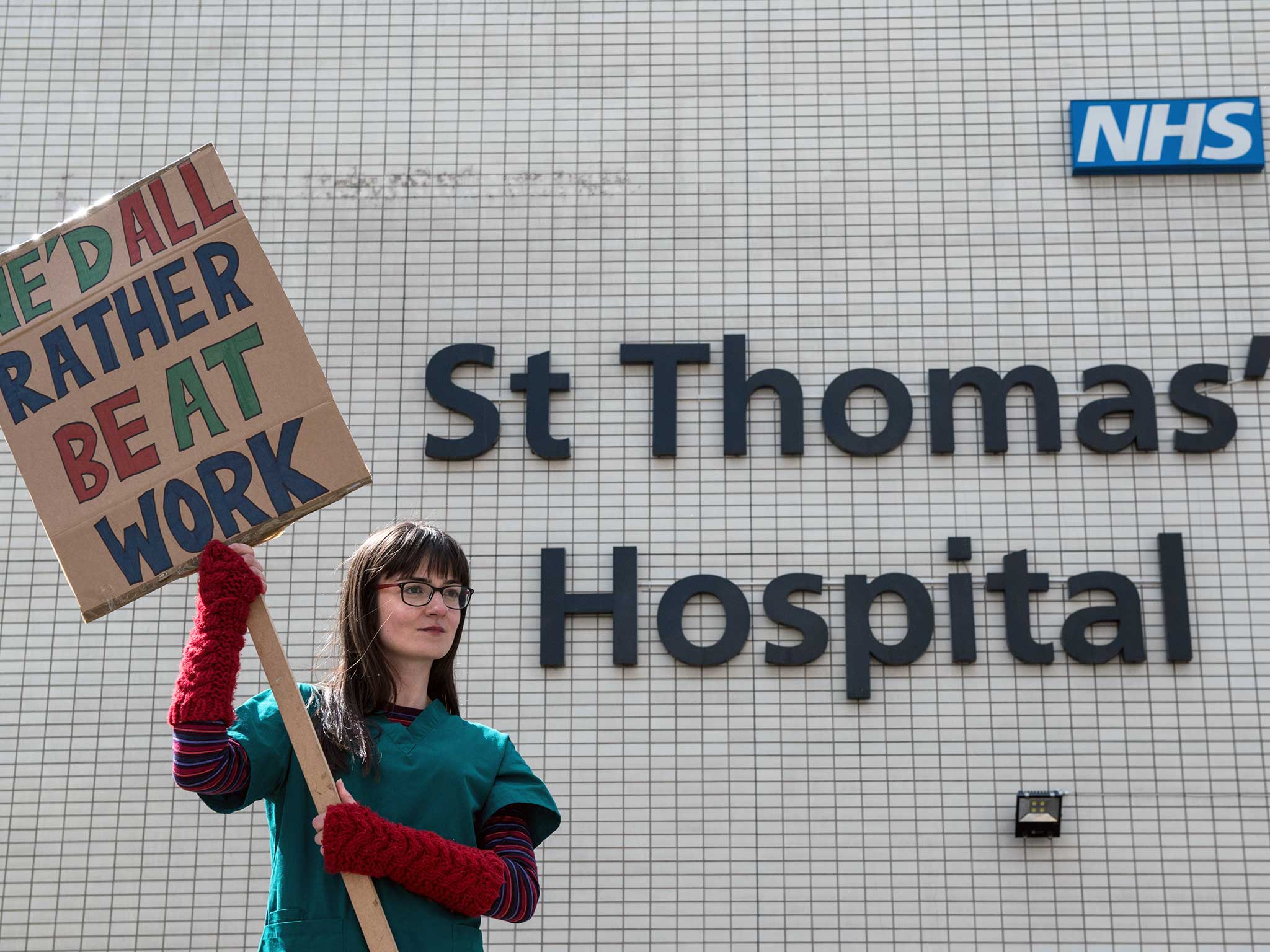Why my fellow junior doctors have rejected Jeremy Hunt's contract, despite the BMA's endorsement
Hunt will continue to allege this is a pay dispute, but the real reason is the gaps in our rotas caused by young doctors quitting the profession in despair. Every one of these gaps puts patients at risk


Your support helps us to tell the story
From reproductive rights to climate change to Big Tech, The Independent is on the ground when the story is developing. Whether it's investigating the financials of Elon Musk's pro-Trump PAC or producing our latest documentary, 'The A Word', which shines a light on the American women fighting for reproductive rights, we know how important it is to parse out the facts from the messaging.
At such a critical moment in US history, we need reporters on the ground. Your donation allows us to keep sending journalists to speak to both sides of the story.
The Independent is trusted by Americans across the entire political spectrum. And unlike many other quality news outlets, we choose not to lock Americans out of our reporting and analysis with paywalls. We believe quality journalism should be available to everyone, paid for by those who can afford it.
Your support makes all the difference.Junior doctors have voted whether to accept their new contract – and their answer is no. And really, what did everyone expect? You stoke fear, mistrust and unease in your electorate; you reap your rewards at the polls. Except in this referendum – the junior doctor one – the individuals unnerving their constituents weren’t jingoistic Brexiteers but NHS overlord Jeremy Hunt and his sidekick, Ben Gummer.
No doubt, in that brief moment last week when Hunt dallied with the idea of running for Prime Minister – an absurdity hastily abandoned when he realised how much out-of-hours’ work the job entailed – he was plotting to use a junior doctor ‘yes’ vote as evidence of his superlative negotiating powers. Except the vote didn’t quite go his way. Strangely, after a year of slandering, smearing and undermining junior doctors (we were ‘militants’, ‘radicals’ deserving of a ‘nuclear option’, remember?), he left us with as much faith in his notorious new contract as Michael Gove had in Boris Johnson.
Doctors voted 58:42 against accepting the latest incarnation of Hunt’s new contract, in spite of its personal endorsement from their trades union representative Johann Malawana, who has resigned as head of the BMA. That puts the Health Secretary in an awkward position. A key tactic of his throughout the last year was to blame ‘politically poisoned’ Malawana and the BMA for inciting the anger and activism of gullible grassroots doctors like me. If only we would trust him, Hunt kept assuring us, we would come to love his contract.
Now Malawana has gone who does Hunt attack? Junior doctors en masse? The same ones he tried to woo with soft soap about us being the backbone of the NHS, the unsung heroes of the NHS frontline? It is one thing for a government minister to go to town on a trades union, quite another to aim his abuse directly at the 54,000 junior doctors without whom the NHS would not function.
Hunt needs to tread carefully. Already, his self-created legacy is to be remembered as the man who left a generation of young doctors as demoralised, alienated and embittered as it is possible for a workforce to be.
The Health Secretary’s problem – that there isn’t a doctor in the country who believes a word he says anymore – is a real and immediate one for patients, made all the more vivid by our post-Brexit world. Even before legions of non-British doctors working in the NHS were made to feel unwelcome and unwanted by Brexit, the NHS faced a staffing crisis. Parliament’s spending watchdog, the Public Accounts Committee, recently estimated that the NHS is short of around 50,000 clinical staff. And that’s before David Cameron’s ‘truly seven-day NHS’ is implemented – though with neither the funds, nor the staff, to ensure the soundbite’s safe delivery. As Meg Hillier, chair of the committee put it: “It beggars belief that such a major policy should be advanced with so flimsy a notion of how it will be funded.”
Hot on the heels of the junior doctors’ referendum result, Jeremy Hunt will no doubt insist upon imposing his contract in the face of a clear democratic mandate from doctors rejecting its terms. Perhaps he will continue to allege this is a pay dispute, centred on our avarice regarding Saturday so-called ‘overtime’. If he does, he would be as myopic as he is belligerent. Gaps in our rotas are rife as missing doctors have quit the profession in despair. Every one of these gaps puts patients at risk.
There is a solution. To rebuild what he’s decimated – to put patients first – Hunt must use actions, not words. He could, for example, commit to publishing national doctor rota gap data at least twice a year, providing honesty and transparency about NHS understaffing. He could address the current loophole denying junior doctors the whistleblowing protection afforded to all other NHS staff. He could, in short, act like a leader.
If he doesn’t, I can only hope our new Prime Minister puts patients first in their reshuffle.
Join our commenting forum
Join thought-provoking conversations, follow other Independent readers and see their replies
Comments